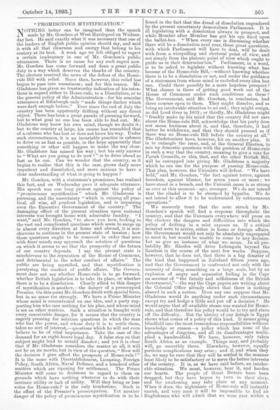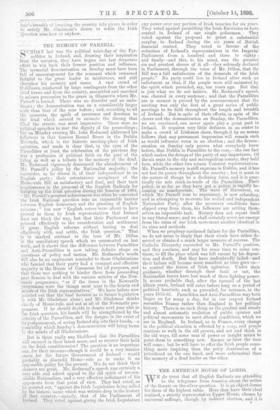" PROMISCUOUS MYSTIFICATION."
NOTHING better can be imagined than the speech made by Mr. Goschen at West Hartlepool on Wednes- day last. He said exactly what it was necessary that one of the leaders of English public opinion should say, and said it with all that clearness and energy that belong to his oratory at its best. A week ago we felt obliged to regret a certain inadequacy in one of Mr. Gosehen's public utterances. There is no cause for any such regret now. Mr. Goschen has come forward and done a great public duty in a way which deserves the thanks of the country. The electors received the news of the defeat of the Home- rule Bill with relief. Since then, however, this relief has begun to pass into uneasiness ; and for this reason. Mr. Gladstone has given no trustworthy indication of his inten- tions in regard either to Home-rule, to a Dissolution, or to the general policy of the Administration—for his oracular utterances at Edinburgh only " made things darker which were dark enough before." Ever since the end of July the country has been apparently drifting without any direct object. There has been a great parade of pressing forward, but to what goal no one has been able to find out. Mr. Gladstone may know his own mind, though we doubt it ; but to the country at large, his course has resembled that of a cabman who has lost or does not know his way. Under such circumstances, it is an invariable practice in cabmen to drive on as fast as possible, in the hope apparently that something or other will happen to make the way clear. Mr. Gladstone has missed his way ; but his only answer to " What are you going to do now ?" is to drive ahead as fast as he can. Can we wonder that the country, as it begins to realise that this is the case, grows daily more impatient and dissatisfied, and more anxious to have a clear understanding of what is going to happen ?
Mr. Goschen, with a statesman's prescience, has realised this fact, and on Wednesday gave it adequate utterance. His speech was one long protest against the policy of " promiscuous mystification " which Mr. Gladstone is pursuing, and the uncertainty " which is ruining all prac- tical, all wise, all prudent legislation, and is impairing even the Executive Government of the country." The damaging effect of the present situation upon national interests was brought home with admirable lucidity. " I want," said Mr. Goschen, "to show you how, looking to the vast and complicated questions which seem to surge up in almost every direction at home and abroad, it is mis- chievous to continue in the present state of tension ; how those questions ought to be removed in order that men with freer minds may approach the solution of questions on which it seems to me that the prosperity of the future of our country depends. I say the present state is mischievous to the reputation. of the House of Commons, and detrimental to the sober conduct of affairs." The public are being mystified, and that mystification is paralysing the conduct of public affairs. The Govern- ment dare not say whether Home-rule is to go forward, whether British legislation is to take its place, or whether there is to be a dissolution. Closely allied to this danger of mystification is another,—the danger of a preoccupied Premier. On this point Mr. Goschen dwelt with special force, but in no sense too strongly. We have a Prime Minister whose mind is concentrated on one idea, and a party sup- porting him who care nothing for his plan, and whose mind is set on other matters. Such a situation is fraught with every conceivable danger, for it means that the country is eagerly pressing for solution questions in which the man who has the power, and whose duty it is to settle them, takes no sort of interest,—questions which he will not even believe to be of vital importance. Take the case of the demand for an eight-hours legal day. A false step on that subject might lead to untold disaster ; and yet it is clear that if Mr. Gladstone considers the matter at all, it will not be on its merits, but in view of the question, " How will the decision I give affect the prospects of Home-rule?" It is the same with Disestablishment, Licensing, Foreign Policy, South Africa, Naval Defence, and a hundred other matters which are ripening for settlement. The Prime Minister will come to decisions in regard to them on grounds which have nothing whatever to do with their intrinsic utility or lack of utility. Will they bring or lose votes for Home-rule? is the only touchstone. Such is the effect of the Premier's preoccupation. Yet another danger of the policy of promiscuous mystification is to be found in the fact that the dread of dissolution engendered by the present uncertainty demoralises Parliament. It is ill legislating with a dissolution always in prospect, and while Member after Member has got his eye fixed upon the ballot-box. " When every one is discussing whether there will be a dissolution next year, these great questions, with which Parliament will have to deal, will be dealt with from a wirepulling and electoral point of view, and• not simply from the platonic point of view which ought to- guide us in their determination." Parliament, in a word, is to be asked to legislate without knowing what has- become of the Home-rule Bill,—without knowing whether there is to be a dissolution or not, and under the guidance of a statesman from whose mind is excluded every idea but one. Could there possibly be a more hopeless prospect ? What chance is there of getting good work out of the House of Commons under such conditions as these ? The Government, said Mr. Goschen, in conclusion, had three courses open to them. They might dissolve, and so bring an intolerable situation to an end ; they might resign, as did Lord Grey in 1832 ; or thirdly, Mr. Gladstone might " frankly make up his mind that the country did not care about the Home-rule Bill, acknoivledge that his party does not mean business about it, and that, therefore, it had better be withdrawn, and that they should proceed as if there was no Home-rule Bill before the country at all." The Gladstonians have, however, hit on another plan. It is to entangle the issue, and, at the General Election, to mix up domestic questions with the problem of Home-rule in such a way that the country, meaning to give a vote for Parish Councils, or this, that, and the other British Bill, will be entrapped into giving Mr. Gladstone a majority which he can use for the purpose of passing Home-rule. That plan, however, the Unionists will defeat. " We have held," said Mr. Goschen, " the fort against terror, against boredom, against bluster, for seven years or more ; we have stood in a breach, and the Unionist cause is as strong as ever at this moment—aye, stronger. We do not intend that the citadel is to be stormed by bypaths. We do not intend to allow it to be undermined by subterranean operations."
We sincerely trust that the note struck by Mr. Goschen's speech will find a response throughout the country, and that the Unionists everywhere will press on the electors the dangers and difficulties into which the policy of drifting in a mist exposes us. If a critical moment were to arrive, either in home or foreign affairs,. the Government would not only be absolutely unprepared to meet it, but would be unable to come to any decision. Let us give an instance of what we mean. In all pro- bability Mr. Rhodes will drive Lobengula beyond the Zambesi in the course of the next few weeks. Suppose, however, that he does not, that there is a big disaster of the kind that happened in Zululand fifteen years ago, and that the Government is confronted not only with the necessity of doing something on a large scale, but by an explosion of angry and separatist feeling in the Cape on account of " the fatuity and selfishness of the British Government,"—the way the Cape papers are writing about the Colonial Office already shows that there is nothing absurd in such a notion. Does any one suppose that Mr. Gladstone would do anything under such circumstances. except try and hedge a little and put off a decision ? He would argue that all available steam was wanted for Home- rule, and that therefore his policy would be to try and stave off the difficulty. But the history of our doings in Egypt shows what comes of a policy of this kind. It means going blindfold into the most tremendous responsibilities without knowledge or reason—a policy which has none of the advantages of Jingoism, and all its disadvantages multi- plied a hundredfold. We have, however, only taken. South Africa as an example. Things may, and probably will, go smoothly there. Elsewhere, however, equally perilous complications may arise ; and if, and when they i do, we may be sure that they will be settled in the manner least likely to be satisfactory or to serve the better interests of the country. It is, as we have said before, an intoler- able situation. We must, however, bear it, and harden our hearts. The people of Great Britain have been drugged, but they have begun to turn in their sleep, and the awakening may take place at any moment. When it does, the nightmare of Home-rule will instantly vanish, and very soon it will be impossible to find an Englishman who will admit that we were ever within 11, hair's-breadth of breaking the country into pieces in order to satisfy Mr. Gladstone's desire to settle the Irish ucstion somehow or anyhow.



















































 Previous page
Previous page